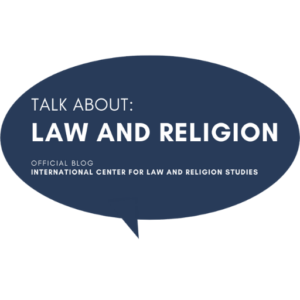 By Talk About: Law and Religion
By Talk About: Law and Religion
The Religious Freedom Annual Review, sponsored by the International Center for Law and Religion Studies at BYU Law School, and co-sponsored by the Wheatley Institution at Brigham Young University, was held virtually on June 15-16, 2021. The 2021 theme, “Religion’s Role in Overcoming Divides and Strengthening American Democracy,” was reiterated by the three keynote speakers, Peter Wehner, Elder Dale G. Renlund, and Sister Ruth Lybbert Renlund. The opening session concluded with remarks by Asma Uddin, L. Whitney Clayton, and Brett Scharffs on religious identity and dignity in America.
Peter Wehner, a Senior Fellow at the Ethics and Public Policy Center, stated that Christians ought to see others as equal. “Don’t withdraw from politics.” Christians should use Christianity to help define a “moral excellence…We’re called upon to be faithful—not successful,” and that Christians should “argue for truth, not for victory.”
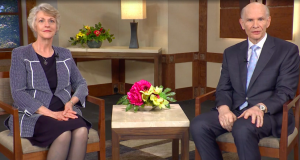
Elder Dale G. Renlund, Quorum of the Twelve Apostles, The Church of Jesus Christ of Latter-day Saints, and Sister Ruth Lybbert Renlund, Senior Fellow, ICLRS, talked about Joseph Smith’s political life. The couple relied on historical sources, including the newest edition of the Joseph Smith Papers, to show how Joseph Smith was involved in the political spheres of his day and was America’s first martyred presidential candidate. He sets a civic example worth emulating. As Elder Renlund explained, “Joseph [Smith] advocated for treating people with dignity, and believed people were capable of learning and changing.”
Asma Uddin, Expert Advisor for the Organization for Security and Cooperation in Europe, Fellow at the Aspen Institute, and author of When Islam Is Not a Religion: Inside America’s Fight for Religious Freedom. She reported that religion is declining in the United States. Why? Because religion is increasingly aligning with political identity. Threatening the fabric of American society, she pointed to the ongoing amalgamation of political tribalism and political tribalism. The antidote to this tribalistic polarization is religious freedom.
“Religion is more than a hobby. …It’s the why and the purpose to our lives,” L. Whitney Clayton explained. Clayon is Emeritus General Authority Seventy, of The Church of Jesus Christ of Latter-day Saints. His message centered around ways to live in a society with others who are different.
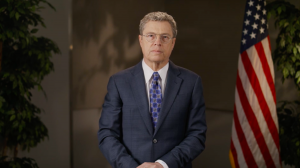
Brett G. Scharffs, Director, International Center for Law and Religion Studies, and Rex E. Lee Chair and Professor of Law, J. Reuben Clark Law School, Brigham Young University, showed how the doctrine of the Church of Jesus Christ of Latter-day Saints leads to the promotion of religious freedom for everyone everywhere. He gave a summary of the recent work that the International Center for Law and Religion Studies’ has been doing on human dignity.
The second session of the Religious Freedom Annual Review showcased two panel discussions and a roundup of United States Supreme Court cases.
The first panel, “Civil Religion, Nationalism, and Patriotism,” was moderated by Elizabeth Clark, Associate Director of the International Center for Law and Religion Studies. Panelists included Barbara A. McGraw, Professor of Social Ethics, Law and Public Life; Founding Director, Center for Engaged Religious Pluralism, Saint Mary’s College of California; Bradley Rebeiro, Associate Professor of Law, J. Reuben Clark Law School, Brigham Young University; Bob Roberts, Founder, GlocalNet; Co-founder, Multi-Faith Neighbors Network; Global Senior Pastor, Northwood Church; and Andrew L. Whitehead, Associate Professor of Sociology and Director of the Association of Religion Data Archives, Indiana University-Purdue University.
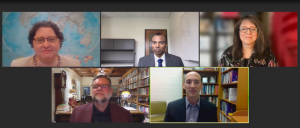
Panelists discussed how Christian nationalism interacts with politics and patriotism. Although Christian nationalism harms civil society, the panelists agreed that there is a remedy. “We need many religions in the public square,” Barbara McGraw said, “all standing on America’s sacred ground of liberty and equal dignity.”
The second panel was moderated by W. Cole Durham, Jr., Founding Director of the International Center for Law and Religion Studies, and was a discussion of President Dallin H. Oaks’ talk “Defending Our Divinely Inspired Constitution,” given at the April 2021 General Conference of The Church of Jesus Christ of Latter-day Saints.
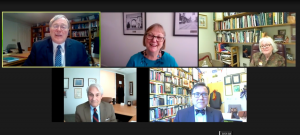
Panelist included Christine M. Durham, Justice, Retired, Utah Supreme Court; Appellate attorney, mediator, arbitrator, Zimmerman Booher; Thomas B. Griffith, Former Judge of the United States Court of Appeals for the District of Columbia Circuit; Paul E. Kerry, Associate Director, International Center for Law and Religion Studies, J. Reuben Clark Law School, Brigham Young University; and Jane Wise, Associate Director, International Center for Law and Religion Studies, J. Reuben Clark Law School, Brigham Young University.
Thomas B. Griffith summarized President Oaks’ talk: “We are in a perilous moment, and [members of the Church of Jesus Christ of Latter-day Saints] have a special obligation to help lead the country out of it. …we’re not going to do that by doubling down on our prior political biases. [President Oaks is] asking us to act differently. …we should seek to moderate and to unify.”
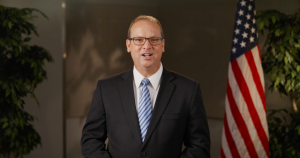
Gary Doxey, Associate Director of the International Center for Law and Religion Studies, moderated the final panel with David Moore, Sterling, and Eleanor Colton Endowed Chair in Law and Religion; Associate Director, International Center for Law and Religion Studies, and Stephanie Barclay, Associate Professor of Law; Director, Religious Liberty Initiative, University of Notre Dame Law School.
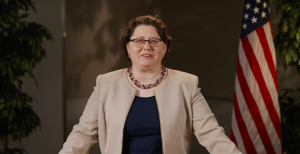
They discussed U.S. Supreme Court cases involving religious freedom that were handed down over the past year. Many cases have involved the rights of religious groups to gather against public health mandates. Many, as David Moore explained, involved injunctive relief. Stephane Barclay discussed the monumental Fulton v. City of Philadelphia, Pennsylvania, which may be the most important case relating to religious freedom in the past decade.
Elizabeth Clark then concluded the conference by posing the following question: as believers, how should we live in the public sphere? Her answer is profound: If we set aside politics from religion, religion can strengthen—not tear apart—American democracy.
